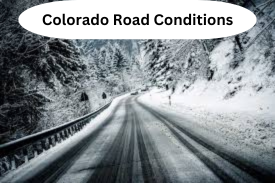As winter sets in, monitoring Colorado road conditions today becomes essential for safe travel, especially for those planning to navigate the state’s mountainous regions. With frequent snowstorms, icy roads, and potential avalanche risks, staying informed about current road conditions can help drivers avoid delays and ensure their safety. This guide offers live updates and tips on how to prepare for winter travel in Colorado.
How to Check Colorado Road Conditions Today
1. Real-Time Updates from CDOT
The Colorado Department of Transportation (CDOT) provides up-to-date information on road conditions through their website COtrip.org and the COtrip Planner app. These platforms offer real-time alerts on road closures, traffic incidents, and weather-related hazards. Drivers can also sign up for text alerts to receive notifications about their preferred travel routes.
2. Monitoring Road Conditions on I-70
One of the most critical highways in Colorado, Interstate 70 (I-70) often experiences heavy snowfall and ice during winter. Sections like Georgetown to Vail Pass and Eisenhower Tunnel are known for severe weather impacts. To ensure a smooth journey, travelers can access live camera feeds and snowplow tracking via the COtrip app.
3. Key Resources for Winter Travel
- 511 Road Condition Hotline: Call 511 for voice updates on current road conditions.
- Snowstang and Pegasus Shuttle Services: CDOT offers shuttle services to major ski resorts, helping avoid the stress of driving in snowy conditionsColorado Department of Transportation.
- Traction and Chain Laws: During severe winter conditions, CDOT may enforce chain and traction laws. Make sure your vehicle is equipped with winter tires or chains to comply with these regulations.
Essential Tips for Winter Driving in Colorado
1. Preparing Your Vehicle
Before hitting the road, ensure your vehicle is winter-ready. Pack essential items like snow scrapers, blankets, water, food, tire chains, and a first aid kit. It’s also crucial to have non-clumping kitty litter or sand for traction if you get stuck.
2. Navigating Icy Roads and Snowstorms
Driving in Colorado’s winter conditions can be challenging. If you encounter icy roads or a sudden snowstorm, slow down, increase your following distance, and avoid sudden braking. For safety, consider postponing travel during white-out conditions.
3. Avalanche Safety on Mountain Passes
Colorado’s mountain passes are prone to avalanches during heavy snowfalls. Areas like Loveland Pass and Berthoud Pass may experience temporary closures for avalanche mitigation. Check CDOT updates before traveling through these regions.
Conclusion
Winter in Colorado, therefore, presents unique challenges for drivers, with snowstorms, icy roads, and unpredictable weather patterns. To navigate safely, it’s crucial to stay informed about Colorado road conditions today. By using resources like the CDOT’s COtrip website and preparing your vehicle for winter, you can minimize travel risks and enjoy the beauty of Colorado’s winter landscape. Stay safe and drive cautiously to avoid winter travel hazards.
FAQs About Colorado Road Conditions Today
Q: How can I check Colorado road conditions before traveling?
A: Visit COtrip.org or use the COtrip Planner app for real-time road updates and traffic alerts.
Q: What is the Colorado Traction Law?
A: The Traction Law requires vehicles to have snow tires, tire chains, or 4WD during severe winter weather. Failure to comply can result in fines.
Q: Are there any road closures in Colorado due to snowstorms?
A: Closures can occur on highways like I-70 during heavy snow. Check the COtrip website or call 511 for the latest information.

